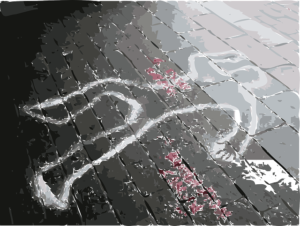 Debbie and I were surfing the same wavelength this week. If you didn’t get a chance to read her post, be sure to check it out.
Debbie and I were surfing the same wavelength this week. If you didn’t get a chance to read her post, be sure to check it out.
As technology has become more integral to daily life, authorities have increasingly sought evidence from mobile phones, laptops, social media, and even a video game.
Last summer, I heard about a murder case in Arkansas. The high-profile defense attorney, Kathleen Zellner — best known as Steven Avery’s attorney in season two of Making a Murderer — petitioned the court for Amazon Echo recordings.
The Amazon Echo entered the November 2015 murder case after Victor Collins (47), a former Georgia police officer, died in the suspect’s hot tub. An observer told police he’d heard music streaming through the device that evening.
Zellner’s client, James Bates, invited two friends to his Bentonville home to watch college football, drink beer and shots of vodka. After the game, the three men slipped into Bates’ hot tub. Around 1 a.m., Bates said he went to bed. When he woke in the morning, Collins was floating face-down in the hot tub.
The defense contended the death was a tragic accident, stemming from high levels of alcohol. At the time of death, Collins’ blood-alcohol content was at .32, four times the legal limit to drive in Arkansas.
Investigators believed Collins’ body showed evidence of strangulation prior to drowning. Signs of a struggle they’d seen in the house, including a broken shot glass, dried blood on the floor, injuries to both Collins and Bates, and indications that someone hosed down the patio and hot tub before police arrived. They further contended Bates’ water heater, another smart device, recorded an exorbitant amount of water used in the early morning hours, in what investigators believed was an attempt to conceal the crime. The defense argued the same amount of water had been used 12 hours prior to the night in question.
After Amazon released the recordings, the prosecution dropped all charges against Bates. Why? The DA stated, “They cannot meet the legal requirements to proceed.” No further mention of the Echo recordings, but writers don’t need the outcome to envision the story Alexa might tell.
See where I’m going with this? We could spin the recordings anyway we want. Keep that in mind while you read this next case.

Fast-forward to January 27, 2018, when Amazon Echo recordings could solve a brutal double homicide.
In my home state of New Hampshire — a 30-40 minute drive from where I live — two slayings rocked the quaint Farmington community. In the early morning hours of January 29th, Dean Smoronk returned home after a trip to Florida. When he arrived, his live-in girlfriend, Christine Sullivan, and a friend, Jenna Pellegrini, who was staying with the couple at the time, were both missing. He called 911 around 3 a.m., and said he thought there’d been a murder.
When officers arrived at the scene, Smoronk pointed out a large blood stain on the mattress in the upstairs bedroom and dried blood in the kitchen, with a blood smear on the refrigerator. Hours later, New Hampshire State Police found the two women cocooned in tarps, stuffed under the porch. Eight stab wounds littered Sullivan’s body, her skull fractured by a blunt object. Pellegrini’s head, face, and chest showed 48 stab wounds.
During the search, investigators also found several knives wrapped in a flannel shirt — the same flannel shirt worn by Timothy Verrill, caught on the home’s surveillance footage that night. Verrill was a known drug dealer in the area. At the time of the killings, he was friends with Sullivan and Smoronk. Some speculate he was also Pellegrini’s boyfriend, but there’s some conflicting evidence on whether that’s true. Allegedly, Verrill feared the two women were working with authorities on an undercover sting, of which he was the intended target.
State Police seized an Amazon Echo from the crime scene. Had Alexa recorded the murders and subsequent cover-up?
On Oct. 30th, Senior Assistant Attorney General Geoffrey Ward asked the judge to direct Amazon.com to produce any recordings made between Jan. 27 and Jan. 29, 2017, suggesting evidence of the murder and/or hindering prosecution could be found on the device.
In the motion, made in lieu of an application for a search warrant, Ward wrote, “As part of the normal functioning of an Echo electronic device, activated either intentionally or accidentally by ‘wake up words,’ audio recordings are made from the moment when the device is activated. Specifically, when the Echo detects a ‘wake up word(s),’ the device begins audio recording through its integrated microphones, including recording the fraction of a second of audio before the ‘wake up word(s).’”
Wake up words include Amazon and Alexa, but as Debbie pointed out, Alexa records even when those words aren’t mentioned.
Ward’s motion also asked for a wider scope in order to identify cellular devices that paired with the smart speaker within the same time period.
The judge ordered Amazon to hand over the recordings. No word yet on what Alexa overheard that night. The trial begins in May, 2019.
So, TKZers, if you were writing these stories, what would you reveal in the recordings? Get your creative juices pumping by including a jaw-dropping twist!
WINGS OF MAYHEM is on sale for 99c.
“The story spins ahead with escalating velocity and well-rendered literary layers, always leaving the reader pleading for more information while delivering just enough with exquisite timing, always nailing a clear and rationale dissection of what seemed in the moment like insanity or illogic. The craft of the writer is on display from page one, with intense pacing, deeply drawn characters and a matrix of plot elements that never lets you see the big picture as completely as you think you do, thus setting up an ending that demands you stick with it until the final, unexpected twist.” ~ USA Today Bestselling Author Larry Brooks


Sue, I can see your new series now–Detective Alexa, Crime Fighter!
Thanks for sharing those amazing stories. As Alexa and her accessories invade more homes, they will no doubt make the news in all kinds of cases–not just murder but also drug dealing, political conspiracy, divorce, child custody, etc., etc.
Prosecuting attorneys will argue Alexa’s evidence is admissible while defense attorneys will scramble to suppress it. The story possibilities are endless.
Does this mean we crime writers should no longer read our confession scenes out loud for fear they may incriminate us?
Great post, Sue!
Hahahahaha. You may want to turn off Alexa first, Debbie! Imagine? You’re in the middle of reading your work aloud when the FBI shows up on your doorstep.
And wouldn’t that scene “an author reading a confession scene to himself with the FBI showing up at that moment” be a story all by itself, too? 😀
Haha. Indeed it would!
Interesting. I had some rebate money that was expiring, so I bought the “Spot”. We have no smart devices in our house, and so far, all I’ve used her for is playing music, giving me the weather forecast, and setting shopping lists and reminders. So, I guess someone would know that I’m doing laundry. The app will show what I ask her and what she answers, but … ‘set a laundry reminder for 45 minutes’ isn’t very exciting.
But yes to the possibilities.
Terry, I’m paranoid now. All I have with Alexa is my Kindle Fire, but I’ll catch her eavesdropping all the time. Now, whenever my husband and I are talking I shut her down. Siri’s bad enough. I don’t need to two AI’s listening in. Our conversations can get very interesting if taken out of context, especially when we’re discussing plot ideas. 😉
I’ve never been aware of her listening unless I give her the wake up command. She did tell me that on this day in 1958, Lego bricks were patented. And yesterday, she told me it was National Chocolate Cake Day, which IS critical information.
Haha! Absolutely critical. 🙂
Well, it’s such an interesting possibility. But then, if you do a sweep of YouTube, you will find videos wrestling with the possibilities that, because Alex is an electronic system, it can somehow brush wings with the supernatural–touch the sleeves or faces of ghosts or other unknown things.
Some contend that Alexa is a part of data building system that eventually, among a whole host of things, be able to pick out our voices, perhaps our images, for the NSA, the CIA, the FBI, or Homeland Security. It could, some fear, keep track of our medical and dental appointments and–TA DA!–select the best time for us to show up to get our Marks of the Beast on our forehead and arm.
So, why not help solve murders and other crimes. (Perhaps even, Alexa could help find many or most of those people who are going missing in our national forests and parks and other places. And if it CAN get into the electronic whispers of ghost and goblins, little people, and other such spookies, maybe we could get get Alexa to yell “GET OUTTA HERE!” every so often through the night. Could we wire Alexa up to sort of give protection to those that have bigfoots roaming the properties near their homes? Perhaps once or twice during the night, Alexa could turn on the exterior spots and yell, ” ‘EY! BIG GUY! WE’VE GOT BOTH THE 2/5 MARINES AND POLICE SWAT COMIN’ TO TAKE CARE OF YOU IF YOU DON’T LEAVE RIGHT NOW!”
I make fun of Alexa because we’ve talked it over at our house, and we don’t think we want something present that we really don’t what it’s capabilities are, or can absolutely control. (And as I write this paragraph, something loud just popped in our dark living room. Perhaps we’ve already be Alexa’ed somehow.)
But it would have been more fun if they had named the system and device Alexev. Because somebody, or a whole bunch of somebodies, could pick up on the name Defective Alexev for their primary protagonist crime solver in their new series.
Unless it won’t let you.
Oh my gosh, Jim. There’s so much to love about your comment.
“… it can somehow brush wings with the supernatural–touch the sleeves or faces of ghosts or other unknown things.”
Wow. That opens the door to endless plot possibilities. In real life, that would be kinda cool, though, if she had the ability to do it on command. “Alexa, contact my mom. I need her advice.”
Love the idea of Alexa finding the missing! I picture Fish & Game traipsing through a darkened forest with the device. And voila. They’re able to narrow in on the injured hiker.
Your remark about Alexa warding off intruders reminds me of a glitch Amazon recently fixed, where Alexa was laughing for no reason. Numerous people complained that she’d break out in an evil guffaw in the middle of the night. Talk about creepy!
Jim, you can both listen in and talk over Alexa remotely through the app. We checked on my son that way when he was house sitting. We’ve also been known to talk to our cats when we’re gone, too.
Supposing we were to find out that Alexa or Siri was somehow responsible for the first words heard on the then-new telephone.
“Mr. Watson–come here–I want to see you.”
Brrrrrrr . . .
One of my guilty pleasures is anecdotal ghost stories via podcasts. And, yes, Alexa and Siri have both talked to unseen presences and recorded unheard voices, a frightening amount of times. House and outside security has captured weird stuff, as well. The biggest culprits of spooky, though, are baby monitors and electronic toys. After some of these stories, you couldn’t pay me to have a Tickle Me Elmo. (Shudder)
During my mom’s final years, I had a baby monitor for her room in case she needed me during the night. I started picking up voices, and we live a good distance from other homes. It spooked me out, but it proved to be an elderly couple in a condo through the woods. I figured that out because of their barking poodle.
Marilynn, wow! You’re gonna send me down research rabbit hole with Alexa and Siri talking to unseen presences.
I used a baby monitor in CLEAVED, then added to the creepiness by having the killer sing nursery rhymes through it. I even gave myself nightmares!
Both you and Debbie have chilled me to the bone with these posts, Sue!
You’ve set up a dilemma. Should we keep Alexa around just in case we are murdered? As a very paranoid person, a tiny part of me is relieved it might pick up evidence of a crime. But how might all this data collection affect our lives? And what about the seeping of the culture of outrage into our laws?
The notion of every man’s (person’s) home being their castle is fast slipping away. It seems we’ve given the barbarians control of the drawbridge.
The last time I turned off Alexa during one of our conversations, my husband asked me why I might think that Siri wouldn’t be listening from our phones as well. Excellent point.
Terrific post.
You’re not alone, Laura. This technology freaks me out, too! During the summer, when I first heard about the murder case, I was discussing the legal ramifications with a few local LEOs. New Hampshire is a two-party consent state. An argument could be made that the killer didn’t consent to the recording, even though he was in the act of committing murder.
My scenario was a little different, though. I wanted to know if the victim told Alexa to record moments before the attack, could law enforcement use the data to convict the killer? It’ll be interesting to see how the NH case turns out.
I used Siri in SCATHED, and her haunting words really upped the tension.
As I write this, my desktop Mac has Siri cut off, and the webcam is covered with a plastic “door” I can open and close. I refuse to have anything like Alexa in my home, just on principle, and my phone and TV aren’t “smart.” Not that anything I do or say would be worth anyone’s interest.
Many years ago, I attended a poetry reading and talk by a famous poet. Somehow, her conversation turned to her nasty divorce and her soon-to-be ex-husband’s PI tapping her phone. She always had a good giggle whenever she was on the phone with another poet where they would spend an hour discussing comma placements on one of their poems. Boy, I hope that PI got paid well to listen to that.
Haha. Not the most exciting conversation to overhear.
On my Mac, I keep my camera covered and the mic turned off at all times. Too many hackers around these days. Good idea about turning off Siri. I rarely use it on the computer. Flipping her off switch now …
Fascinating!
I can’t add much to this since I live in a dumb-house. Seriously, the best I have is a TV with internet and my iPhone app that lets me activate our alarm system from anywhere in the world. And my refrigerator chirps if it’s left open.
Do barking dogs count as smart devices?
Haha. I’d take barking dogs over any smart device! They’re more fun to cuddle. 🙂
Electronic devices will indeed listen to you. It will be opening a whole new area of evidence and likewise a new device (sorry) for mystery writers. Two party consent states, bad actors who take the device with them (won’t help. The information is with Amazon) all become new things for your stories.
Indeed, Alan. I can see stupid criminals thinking if they took the device from the crime scene, they’d have nothing to fear. And they’d be oh, so wrong. But smart devices do create new fodder for books, and that’s a good thing … as long as they’re not eavesdropping on me.
It isn’t all that new. My father was an attorney. He had a client who was convinced the FBI was tapping his phone. For giggles he would dial a random number and say things like, “I will meet you at Grand and San Fransisco at 1:30 for the smack.” and hang up. Then look out the window for a car to move.
Did he catch a car moving, or did he also wear a tinfoil hat? 🙂
Back in the 1970s, I was the assistant director of the Upward Bound program at the University of Oklahoma. It was a time when the state and fed law enforcement authorities were convinced that the Indian people of the state were getting read to riot or rebel or something. (Nothing like that was actually going on.)
Our program was affiliated with an American Indian organization. During the spring and summer height of the dust up, one of the law enforcement agencies–I’ve always suspected the FBI–was tapping our phones. The electronic noise would get so bad, that we would have to say into the receiver, “Hey, Guys. we can’t hear again.”
The noise would, after a few beeps, clicks and clacks, clear up immediately.